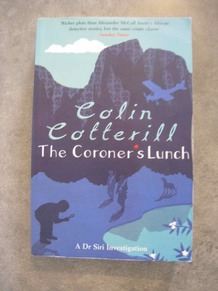Monday, 11 October 2010
 Having spent a lot of time reading crime fiction over the past few years I’ve reached the point where I’m just about psychopath’d and sociopath’d out.
Having spent a lot of time reading crime fiction over the past few years I’ve reached the point where I’m just about psychopath’d and sociopath’d out.
Not that I’m about to change my reading habits. It’s more a case of finding authors with something going for them apart from the ability to dream up characters that epitomise the depths to which human behaviour can descend.
The bookshelves are well-stocked with prime examples of what I’m talking about - James Lee Burke and his daughter Alafair, Michael Dibdin, Le Carre, Andrea Camilleri, Peter Robinson for starters. I’ve got one to join them in the form of Colin Cotterill. He’s about my vintage, London-born, lives in Thailand with a background in education and child protection, much of it in south-east Asia, and he’s come up with a setting and cast of characters that really work.
A cynic may be inclined to dismiss a lot of the exotic locations, eccentric characters sub-genre of crime fiction as variations on a formula, but in Dr Siri Paiboun, national coroner of Laos Cotterill has come up with a welcome variation on a much-tried theme.
The time and place in which the stories are set helps a lot. There won’t be many readers familiar with Laotian history, so setting the series in Laos following the end of the Vietnam War and associated conflicts means the exotic location factor is present in spadefuls before you start looking at characters.
There’s an indication of what’s in store inside the cover of The Coroner’s Lunch with Form A223-79Q, Dr Paiboun’s CV, delivered with a self-mocking and totally irreverent tone.
In a nutshell, born, presumably to Hmong parents in Khamuan Province in 1904, orphaned at an early age, Siri Paiboun finds himself shipped off to France by an unnamed sponsor, where he studies medicine. Along the way he falls for Bouasawan, an ardent Communist, and since a relationship isn’t going to happen unless the suitor joins the Party what comes next is more or less inevitable. His medical training complete, Siri returns to Laos, and when war comes to Vietnam and Laos in 1940, the jungle is where Siri and his wife end up for the next thirty-five years. Bouasawan dies along the way, and when the Pathet Lao finally win the decades-long civil war Siri reckons he’s done his bit and is entitled to retire from the medical profession.
Unfortunately, the educated class have fled the country, and the only doctor capable of performing autopsies has crossed the Mekong, allegedly in a rubber tube so there’s a need for a national coroner. As one of the few doctors left, despite the fact that he lacks the training, supplies or equipment the job would normally require, 72-year-old Siri is assigned to the morgue to work with Nurse Dtui, a reader of outdated fashion magazines and Mr. Geung, who may have Down Syndrome, but has managed to retain a vast amount of information acquired from working under Siri’s predecessor.
As he sets out to get to the bottom of his cases, it’s his interactions with his colleagues and the people he encounters along the way that give the books much of their appeal. There are a range of sharply-observed characters apart from Siri and his colleagues in the morgue.
For a start he has to deal with his supervisor, the young and patronising Judge Haeng, who would prefer reports to read death by cardiac arrest.
At lunch time each working day, Siri buys his baguette and strolls down to a log on the banks of the Mekong, where he eats in the company of equally cynical Politburo member Civilai, and at night Siri is visited by the spirits of the corpses he’s worked on, from whom he learns the details of their deaths. If you’re going to have difficulty with anything in these stories, this supernatural element is probably it.
The dreams leave him shaken, but contribute what would, in other characters - Montalbano and Aurelio Zen, for example - be intuition. The supernatural element adds a frisson of exotica to an already exotic setting, and works, at least in part, because Siri is a devout sceptic.
The plot line of The Coroner’s Lunch involves two seemingly-unrelated cases. Mrs Nitnoy, wife of a senior Party official, dies at a Women's Union meeting and her husband is quite definite that there’s nothing suspicious about the cause of death. At the same time, the bodies of tortured Vietnamese soldiers, formerly tied to rusty artillery shells, start bobbing to the surface of a lake, creating an international crisis between Laos and Vietnam. Resisting pressure from above and struggling to find evidence before it disappears, Dr Siri also finds himself the victim of mysterious attacks.
The two cases are, predictably, intertwined. Faced with official cover-ups and a diplomatic crisis, Siri enlists old friends, Hmong village shamans, forest spirits, the dead - and even uses the odd bit of medical deduction - to solve the crimes. Along the way he is sent into the jungle to find out why the commanders of a military unit supposedly helping to rebuild communities after the war have died mysteriously.